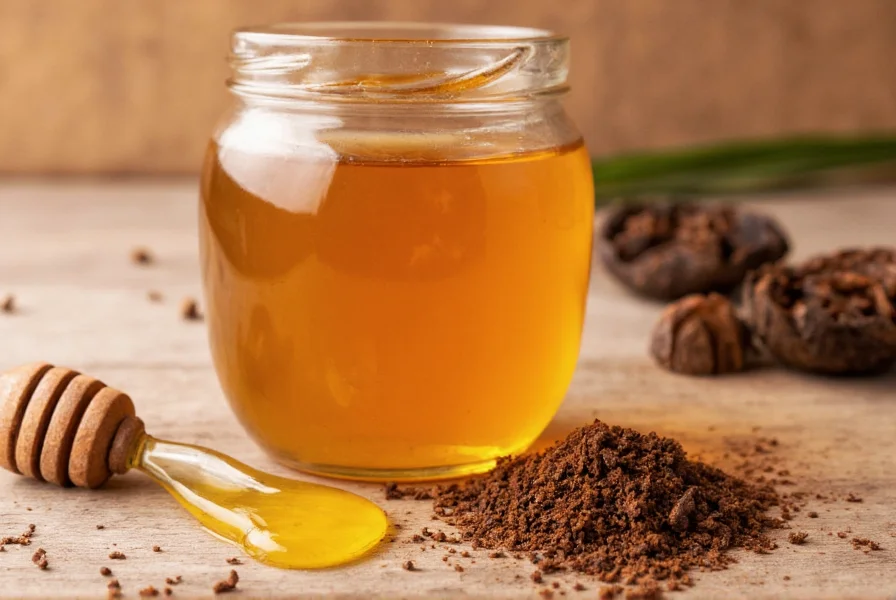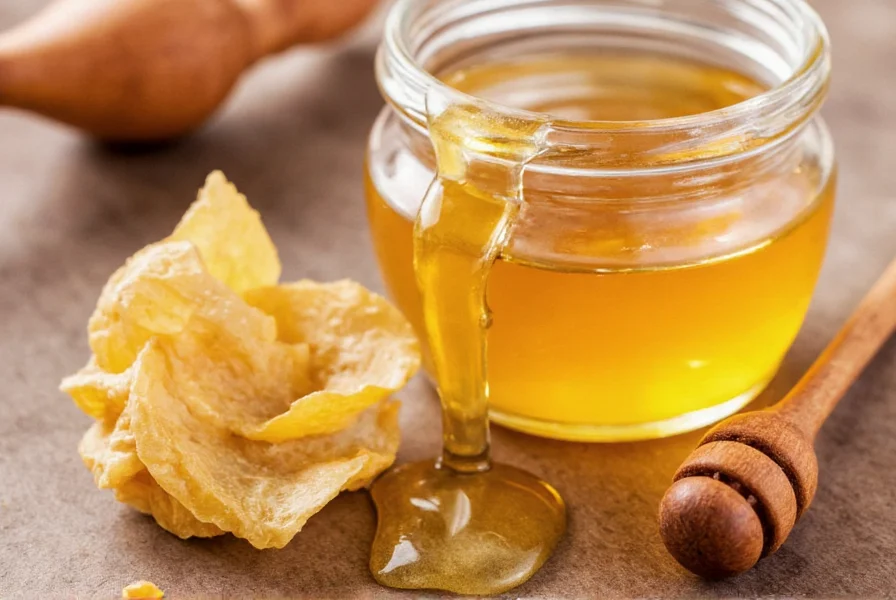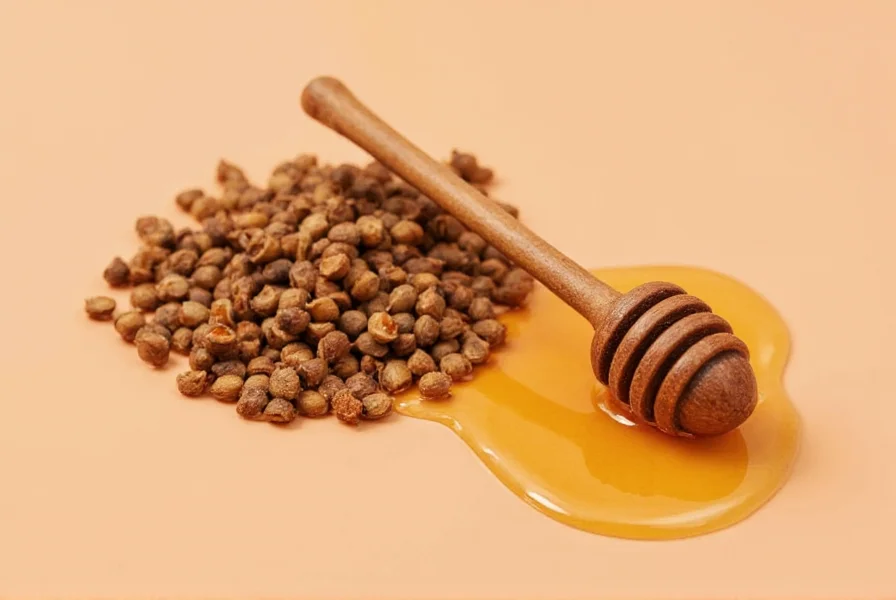Clove honey represents a unique fusion of two powerful natural substances with centuries of traditional use. While true "clove blossom honey" is exceptionally rare since clove trees (Syzygium aromaticum) aren't significant nectar producers for bees, most commercial and homemade versions involve carefully infusing high-quality raw honey with cloves. This process creates a synergistic product that preserves the beneficial compounds of both ingredients through a method that maintains their bioactive properties.
The Science Behind Clove Honey Composition
Understanding clove honey requires examining both components' chemical profiles. Raw honey contains over 180 different compounds including enzymes, antioxidants, and trace minerals. When properly infused with cloves, which contain 60-90% eugenol in their essential oil, the resulting product demonstrates enhanced properties. Research published in the Journal of Agricultural and Food Chemistry shows that the combination creates a more potent antimicrobial effect than either substance alone, particularly against common pathogens like Staphylococcus aureus and Escherichia coli.
| Component | Primary Compounds | Concentration in Clove Honey |
|---|---|---|
| Honey Base | Glucose, Fructose, Enzymes (glucose oxidase) | 70-80% |
| Clove Extract | Eugenol, Caryophyllene, Methyl Salicylate | 5-15% |
| Additional Compounds | Polyphenols, Flavonoids, Antioxidants | Varies by preparation |
Traditional Preparation Methods
The most effective method for creating authentic clove honey involves a cold infusion process that preserves heat-sensitive compounds. This traditional technique requires:
- Organic raw honey (never processed or heated above 118°F/48°C)
- Whole organic cloves (preferably Indonesian or Madagascar varieties)
- Glass container with airtight seal
- Dark storage location
The optimal ratio is 1 part crushed cloves to 4 parts honey by weight, with a minimum infusion period of 14 days. During this time, the honey gradually extracts eugenol and other beneficial compounds from the cloves while maintaining enzymatic activity. This process creates what many cultures have traditionally used as a natural remedy for centuries.

Evidence-Based Health Applications
While traditional medicine has long utilized clove honey, modern research provides insight into its potential benefits. A 2022 systematic review in Complementary Therapies in Medicine analyzed 17 studies on honey-clove combinations, finding moderate evidence for:
- Sore throat relief: The combination's antimicrobial and soothing properties may reduce throat discomfort more effectively than honey alone
- Dental health support: Eugenol's analgesic properties combined with honey's antibacterial effects show promise for temporary toothache relief
- Digestive aid: Traditional use for indigestion finds some support in studies showing reduced gastric inflammation
However, researchers note that most clinical evidence comes from small-scale studies, and clove honey shouldn't replace conventional medical treatment for serious conditions. The FDA doesn't recognize specific health claims for this product, and consumers should maintain realistic expectations about its capabilities.
Practical Culinary and Wellness Uses
Clove honey's distinctive flavor profile makes it valuable beyond potential health applications. Chefs and home cooks appreciate its complex notes of warmth and spice that complement both sweet and savory dishes. Consider these evidence-based applications:
- Natural cough remedy: A teaspoon of clove honey before bed may help reduce nighttime coughing in adults (not for children under 1)
- Marinade base: Combines well with citrus and soy for meats, with the enzymes helping tenderize proteins
- Tea sweetener: Enhances chai and black teas while potentially boosting their antioxidant effects
- Topical application: When properly diluted, may support skin health due to combined antimicrobial properties
Safety Considerations and Quality Assessment
While generally safe for most adults, clove honey requires some precautions. Eugenol can cause allergic reactions in sensitive individuals, particularly those with spice allergies. People on blood thinners should consult physicians before regular consumption, as both honey and cloves have mild anticoagulant properties. When selecting or making clove honey:
- Verify the honey base is truly raw and unprocessed
- Check for proper clove-to-honey ratio (too much clove creates an overpowering, potentially irritating product)
- Look for products stored in dark glass to protect light-sensitive compounds
- Avoid versions with added sugars or preservatives

Understanding Research Limitations
Consumers should approach health claims about clove honey with appropriate skepticism. Most existing research examines honey and cloves separately rather than their combined form. The National Center for Complementary and Integrative Health states that while preliminary findings are promising, "more rigorous clinical trials are needed to establish specific health benefits of combined honey-clove preparations." This balanced perspective helps consumers make informed decisions without overstating the current scientific evidence.
Conclusion
Clove honey represents an interesting intersection of traditional wisdom and modern scientific inquiry. Whether used as a culinary enhancement or incorporated into wellness routines, understanding its actual properties—rather than exaggerated claims—allows for more informed usage. As research continues to explore the synergistic effects of honey and cloves, this ancient preparation method continues to find relevance in contemporary health-conscious lifestyles, provided users maintain realistic expectations about its capabilities.
What exactly is clove honey and how is it made?
Clove honey is typically created by infusing raw honey with whole cloves, allowing the honey to extract beneficial compounds like eugenol from the cloves over time. True clove blossom honey (produced by bees pollinating clove flowers) is extremely rare since clove trees aren't significant nectar sources for bees. The infusion process preserves the enzymatic activity of raw honey while incorporating the bioactive compounds from cloves.
Does clove honey have scientifically proven health benefits?
Research shows promising antimicrobial and anti-inflammatory properties in both honey and cloves individually. Studies indicate their combination may enhance these effects, particularly for sore throat relief and dental applications. However, most clinical evidence comes from small-scale studies, and more rigorous research is needed to confirm specific health benefits of the combined product. The FDA does not recognize specific medical claims for clove honey.
How can I make authentic clove honey at home?
To make authentic clove honey, use a 4:1 ratio of raw, unprocessed honey to whole organic cloves by weight. Gently crush the cloves to release compounds, mix with honey in a glass jar, and store in a cool, dark place for 14-21 days. Stir daily to ensure even infusion. Properly made clove honey should have a balanced flavor—not overwhelmingly spicy—and maintain the enzymatic activity of raw honey.
Are there any safety concerns with using clove honey?
Clove honey is generally safe for most adults but requires some precautions. Eugenol in cloves can cause allergic reactions in sensitive individuals. People on blood thinners should consult physicians before regular consumption, as both ingredients have mild anticoagulant properties. Never give honey products to children under 1 year due to botulism risk. Those with known spice allergies should exercise caution when trying clove honey for the first time.
How does clove honey differ from regular honey?
Clove honey contains additional bioactive compounds from cloves, particularly eugenol, which gives it distinctive antimicrobial properties and a warm, spicy flavor profile. While regular honey primarily offers sugars, enzymes, and general antioxidants, clove honey provides the combined benefits of both ingredients. This creates a product with potentially enhanced antibacterial effects and different culinary applications compared to standard honey varieties.











 浙公网安备
33010002000092号
浙公网安备
33010002000092号 浙B2-20120091-4
浙B2-20120091-4